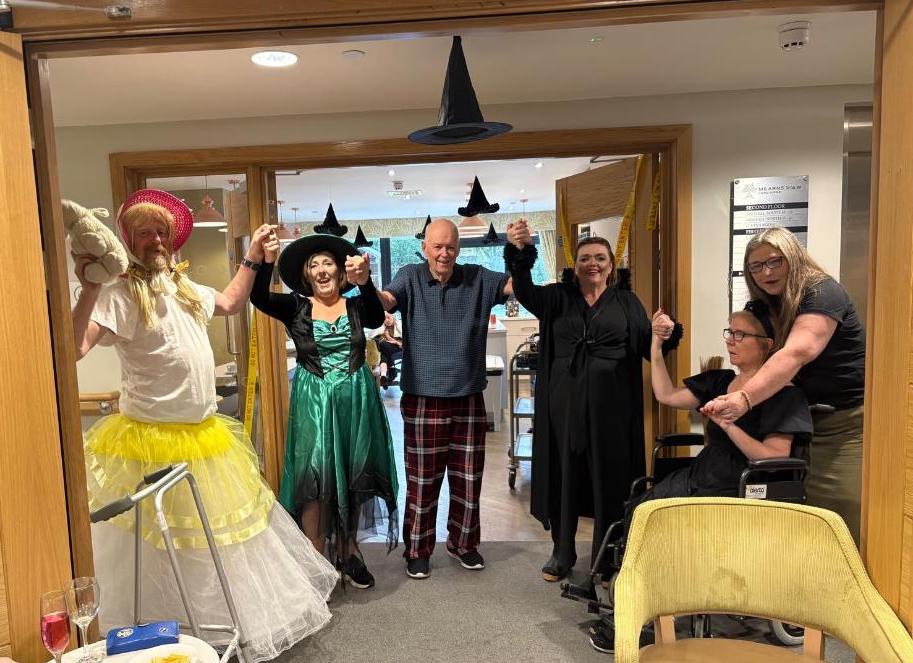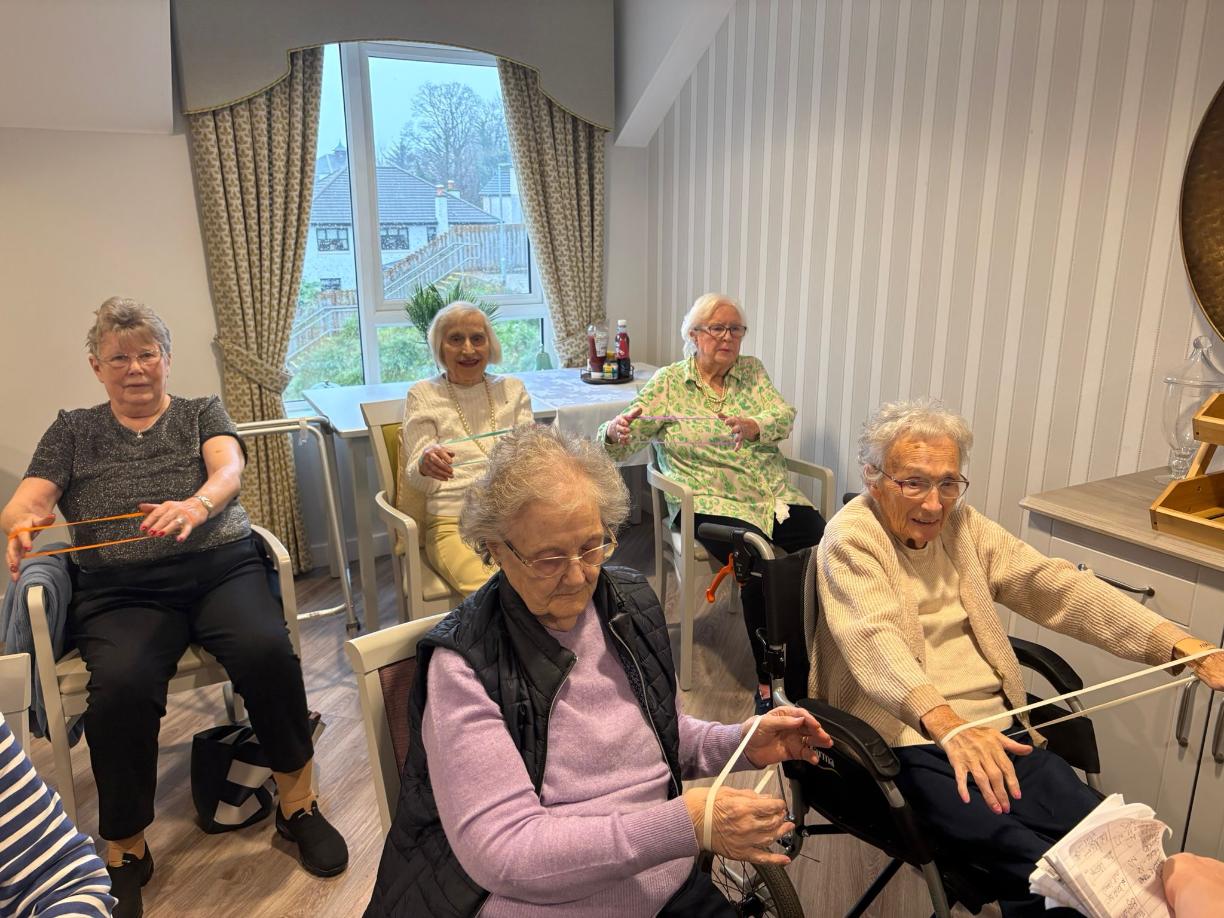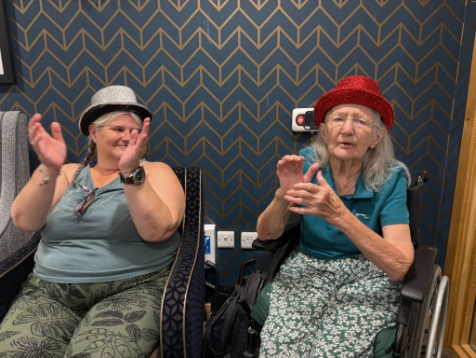Best Activities for Dementia in Care Homes
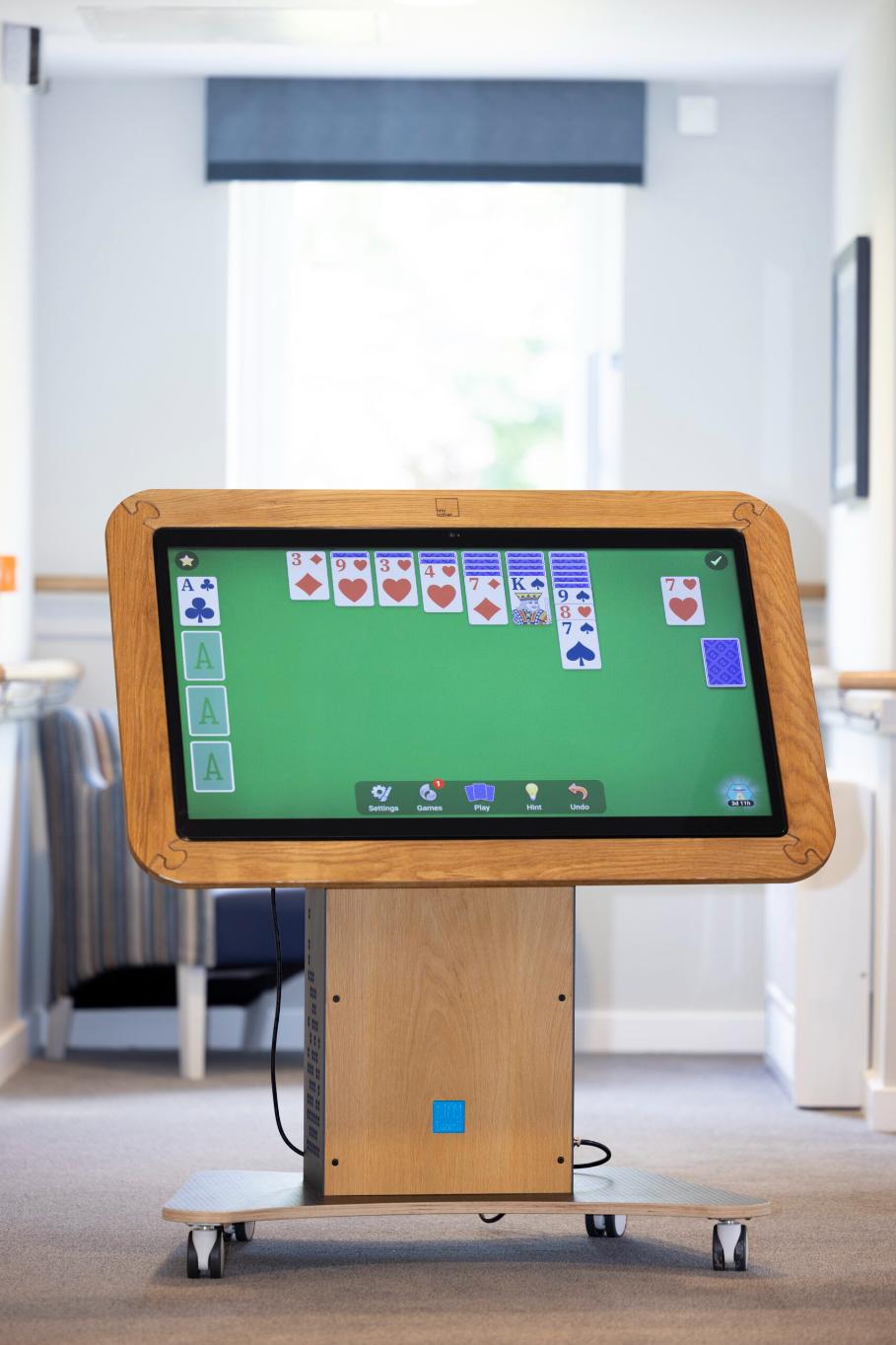
Dementia is a life-changing condition that affects millions of people across the UK. It's more than just a loss of memory - it impacts emotions, communication, and overall cognitive function. While the journey of living with dementia can be very challenging, research and practical experience show that meaningful, tailored activities can significantly improve the quality of life for those living with the condition. In fact, engaging in regular, structured activities has been shown to boost both physical and mental health, reduce feelings of isolation, and even slow the progression of symptoms.
At Mearns View Care Home, we place a strong emphasis on person-centred care. We understand that no two people are the same, and neither are their needs, preferences, or life experiences. Our activities program is designed to cater to each resident’s unique abilities and interests, promoting a sense of purpose, connection, and joy. We believe that every person, regardless of the stage of dementia they are in, can continue to thrive and engage in activities that support their emotional and physical health. Let’s explore some of the best activities that can enhance the wellbeing of people living with dementia.
The Importance of Engaging Activities in Dementia Care
It’s widely recognised that engaging people with dementia in meaningful activities improves their emotional wellbeing, supports cognitive function, and reduces anxiety and aggression. Studies show that residents in care homes who participate in daily activities report higher levels of satisfaction and have better overall mental health.
Dementia impacts various cognitive functions such as memory, language, and problem-solving abilities. However, it’s important to note that even if a person can no longer remember recent events or perform complex tasks, they can still enjoy and benefit from simple, sensory, and enjoyable activities that help them connect to the present moment.
Benefits of Engaging Activities for People with Dementia
- Cognitive stimulation: Regularly participating in activities such as puzzles, word games, or online games helps maintain mental sharpness and can slow cognitive decline.
- Emotional wellbeing: Activities like music therapy, reminiscence therapy, or arts and crafts allow individuals to express emotions and memories, helping to reduce feelings of isolation and frustration.
- Physical health: Gentle exercises, games, and spending time outdoors improve mobility, flexibility, and cardiovascular health while promoting better sleep.
- Social interaction: Group activities encourage socialisation, build friendships, and help combat the loneliness that many individuals with dementia experience.
- A sense of accomplishment and purpose: Engaging in meaningful tasks can boost self-esteem and a sense of purpose, especially when the activity is successful or enjoyed.
At Mearns View Care Home, our approach to dementia care revolves around the belief that people with dementia should live their lives to the fullest. Our care team is trained to provide activities that are not only therapeutic but also fun, enjoyable, and enriching.
Top Activities Beneficial for People Living with Dementia
Here’s a look at some of the most beneficial activities that we offer at Mearns View Care Home, designed to enhance the physical, mental, and emotional wellbeing of those living with dementia.
1. Relaxing Music and Familiar Tunes
Music has a profound impact on the brain, and for people living with dementia, it can trigger powerful memories and emotions. Songs from an individual’s past can evoke vivid memories, and familiar tunes can enhance mood and reduce anxiety.
Music therapy is a cornerstone of a great activities program. It's important to offer group sing-alongs, where residents join together in familiar songs, and one-on-one music sessions tailored to the individual’s preferences. Playing instruments, listening to calming melodies, or participating in rhythm-based activities such as dancing or tai chi to music all provide opportunities for connection and joy.

The Power of Music in Dementia Care
Studies show that music can help to improve speech, mood, and social interaction, while also reducing symptoms of depression and anxiety. Music is particularly beneficial in late-stage dementia, where it can still evoke emotions and create meaningful connections even if language and memory are compromised.
2. Creative Arts and Crafts
Artistic expression provides individuals with dementia a way to communicate and connect with others, even when words may be difficult. Creative activities such as painting, drawing, knitting, and crafting allow residents to express themselves non-verbally, contributing to their emotional and mental health. These activities also provide a sense of accomplishment when completing a project, boosting self-esteem and confidence.
At Mearns View Care Home, we offer a variety of arts and crafts sessions, ranging from simple coloring and sketching to more elaborate projects such as pottery and sewing. These creative sessions foster a sense of calm and purpose, and the finished works are often proudly displayed around the care home, creating a sense of pride for the residents.
3. Word Games and Memory-Boosting Activities
Engaging in cognitive activities in a quiet area like a garden cafe, including word games, jigsaw puzzles, and short stories, provides mental stimulation and improves hand-eye coordination. Word games such as crosswords, Scrabble, and other language-based activities can help to keep cognitive function sharp, while also being a fun and competitive way to stay engaged.

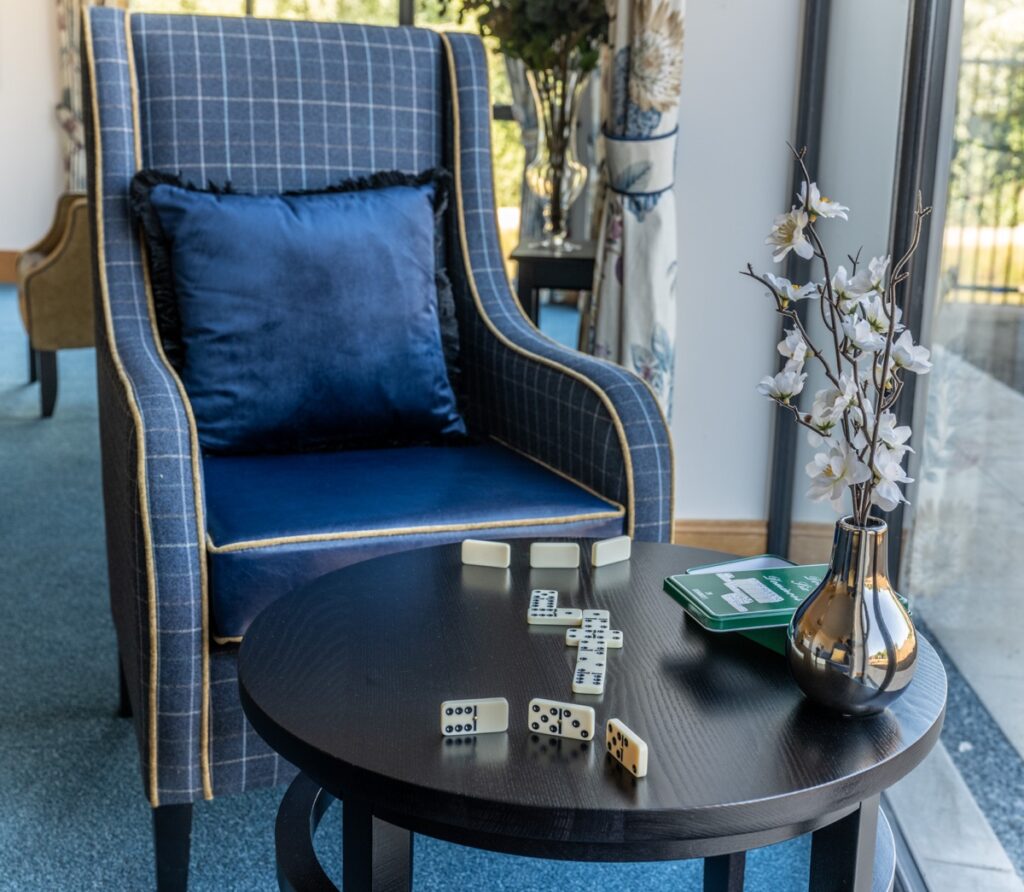
4. Gentle Exercise and Physical Activity
While dementia often causes physical decline, regular physical activity can help maintain motor skills, improve flexibility, and even enhance cognitive function. Exercise promotes the release of endorphins, which improve mood and reduce feelings of depression.
We offer a range of gentle exercises that are tailored to each individual’s ability. Chair yoga and tai chi are perfect for improving flexibility and balance, while light stretching helps maintain mobility and reduces stiffness. Some residents also enjoy walking in our beautiful gardens or participating in seated aerobics.
Physical activity doesn’t have to be strenuous to be beneficial - it's all about promoting movement and helping people feel their best.
5. Reminiscence Therapy and Memory Boxes
Reminiscence therapy is a technique used to evoke memories and spark conversation through sensory stimuli. By engaging individuals in discussions about their past, we can help them reconnect with who they are and recall significant moments from their lives.
One of the ways to implement reminiscence therapy is by creating personalised memory boxes for each resident. These boxes contain photographs, mementos, and objects from their past, which can trigger memories and start conversations with both care staff and other residents. These activities foster feelings of recognition and validation, which are essential for emotional wellbeing.


6. Making Music
Beyond listening to music, making music can be a deeply therapeutic activity for people with dementia. We provide opportunities for residents to participate in making their own music through simple instruments such as tambourines, maracas, and drums. This is not only a fun activity but also a great exercise for improving coordination and providing a creative outlet.
7. Social Interaction and Group Activities
Dementia can be isolating, but social activities are essential for maintaining a sense of connection and wellbeing. Group activities such as movie nights, tea parties, and book clubs promote socialisation, help start conversations, and encourage bonding.
We also organise small groups for more intimate, relaxing activities, allowing residents to interact in a comfortable, low-pressure setting. Whether it's chatting over a cup of tea, participating in a simple craft project, or playing a card game, social interaction is essential for maintaining mental health and reducing the risk of depression and loneliness.
8. Spending Time Outdoors
Spending time outdoors and engaging with nature has been shown to have numerous benefits, particularly for people with dementia. Fresh air, sunlight, and the sights and sounds of nature can improve mood, reduce stress, and provide gentle physical activity.
Mearns View Care Home is located in a beautiful area with a private garden where residents can enjoy nature walks, sit in the sunshine, or take part in gardening activities. Gardening itself is not only therapeutic but can also provide an outlet for creativity and achievement.

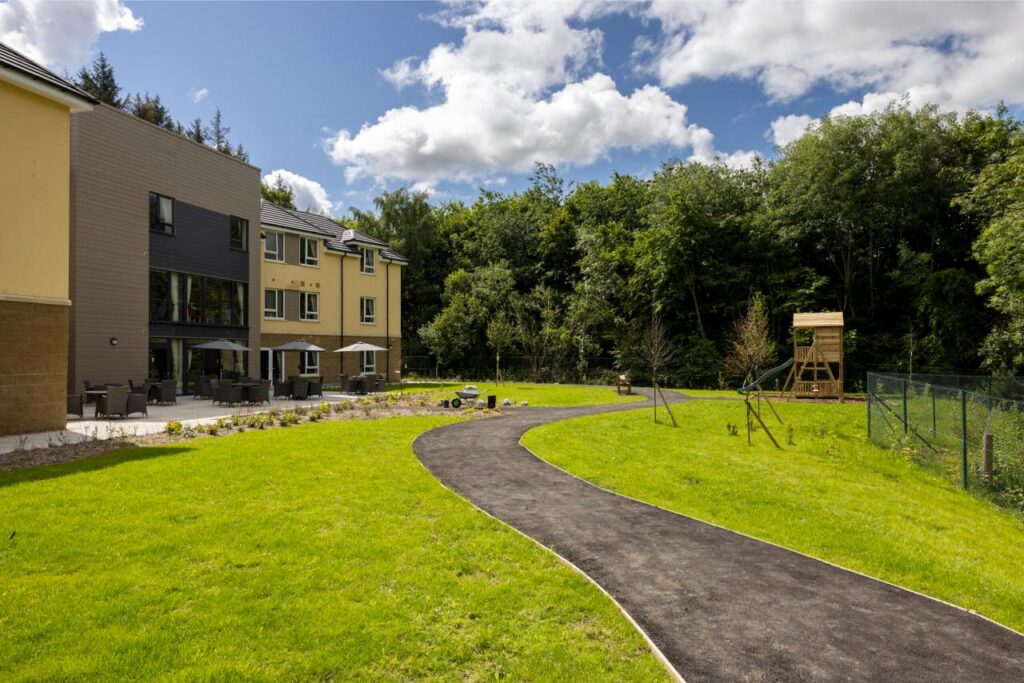
9. Card Games and Mental Stimulation
Card games like bridge, rummy, or snap are fantastic for keeping minds active. These games help with memory recall, strategic thinking, and hand-eye coordination, all while encouraging social interaction. Residents often enjoy the familiar comfort of playing a favourite card game with friends, which helps them feel valued and connected to the community.
10. Relaxing Activities for Calmness and Comfort
We offer a range of relaxing activities such as aromatherapy and using essential oils, which help reduce anxiety and stress. A gentle, soothing spa day with massages, or simply resting in a seated position while listening to relaxing music, can provide peace and comfort.
These activities are designed to help people with dementia feel calm, valued, and at ease, enhancing their sense of self-worth and emotional wellbeing.
11. Staying Active Through Simple Household Tasks
While dementia may affect a person’s ability to carry out complex tasks, providing opportunities to engage in simple household chores can promote a sense of usefulness and belonging. Folding towels, setting the table, or watering plants are all tasks that contribute to a sense of purpose.
At Mearns View Care Home, we involve residents in light, everyday activities that help them feel part of the community. These tasks offer both physical and cognitive benefits and allow residents to feel that they are contributing to the home environment.
Our Commitment at Mearns View Care Home
One of the best way to support people with dementia is by providing a wide range of activities that enhance their physical, mental, and emotional wellbeing. Our person-centred approach ensures that every resident enjoys a tailored program of activities designed to meet their individual needs and interests.
We are committed to creating an environment where residents can continue to thrive, even as they navigate the challenges of dementia. Whether through music, creative arts, physical activity, or simply spending time in nature, we strive to help each individual maintain a sense of purpose and dignity.
Experience the Difference at Mearns View Care Home
If you’re seeking a care home where your loved one’s unique needs and preferences will be respected and met with compassion, we invite you to visit Mearns View Care Home in East Renfrewshire. Our dedicated team is ready to show you how our activities and holistic approach to dementia care can make a meaningful difference.
Contact us today to schedule a tour or learn more about how we support residents living with dementia.

